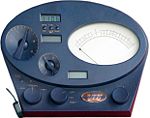Portal:Religion/Selected article/18
Scientology is a body of teachings and related techniques developed by American science fiction author L. Ron Hubbard. It began in 1952 as a self-help philosophy, an outgrowth of his earlier self-help system, Dianetics, and later described itself as a new religion. It claims to offer "an exact methodology" to help humans achieve awareness of their spiritual existence across many lifetimes and, simultaneously, to become more effective in the physical world. The name "Scientology" is also used to refer to the often controversial Church of Scientology, the largest organization promoting the practice of Scientology, which is itself part of a network of affiliated corporations that claim ownership and sole authority to disseminate Dianetics and Scientology.
A stated goal of Scientology is to "rehabilitate" the thetan (roughly equivalent to the soul) to regain its native state of "total freedom." Church spokesmen and practitioners claim that Hubbard's teachings (called "Technology" or "Tech" in Scientology terminology) have saved them from a plethora of problems and enabled them to better realize their highest potential in business and in their personal lives. However, outside observers—including journalists, lawmakers, and national governing bodies of several countries—have alleged that the Church is an unscrupulous commercial enterprise that harasses its critics and brutally exploits its members.

